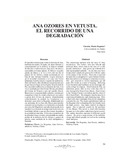Mostrar el registro sencillo del ítem
Ana Ozores en vetusta. El recorrido de una degradación
| dc.rights.license | http://creativecommons.org/licenses/by-nc-sa/3.0/ve/ | |
| dc.contributor.author | Urrutia, María Eugenia | |
| dc.date.accessioned | 2012-04-16T15:36:40Z | |
| dc.date.available | 2012-04-16T15:36:40Z | |
| dc.date.issued | 2012-04-16T15:36:40Z | |
| dc.identifier.issn | 0798-1570 | |
| dc.identifier.uri | http://www.saber.ula.ve/handle/123456789/34841 | |
| dc.description.abstract | El narrador omnisciente relata la historia de Ana, huérfana de madre. El padre, de ideas liberales y comprometido en la política, la deja al cuidado de una fría y codiciosa aya. Ana crece sin amor y reprendida en forma injusta. Al fallecer su padre queda sin dinero y se va a vivir con sus tías al palacio de los Ozores, siendo rechazada por ser hija de una italiana humilde. Logra insertarse en la sociedad vetustense y se casa con Víctor Quintanar, hombre mayor y regente de audiencias. Sufre de hastío y de soledad en su matrimonio por lo que busca refugio en la religión. Don Fermín de Pas, sacerdote ambicioso se enamora de Ana. A su vez es asediada por don Alvaro Mesía, presidente del Casino de Vetusta y jefe del partido liberal. Buen mozo y experimentado seductor, termina por conquistar a Ana. Es retado a duelo por su esposo a quien don Alvaro da muerte, abandonando cobardemente la ciudad. La vergüenza y el deshonor caen sobre la Regenta, abandonada por sus amistades de la clase alta. Busca nuevamente consuelo en la religión y es cruelmente rechazada por celos del Magistral, cayendo desmayada en la catedral. La crítica de su tiempo trató la novela con hostilidad, debido a que en ella el autor desnuda a la sociedad provinciana. Critica las costumbres de las distintas clases sociales, presentando un cuadro prolijo de la nobleza, de los clérigos y gentes de iglesia, como también de la clase trabajadora y humilde. | es_VE |
| dc.language.iso | es | es_VE |
| dc.rights | info:eu-repo/semantics/openAccess | |
| dc.subject | La Regenta | es_VE |
| dc.subject | Adulterio | es_VE |
| dc.subject | Vetusta | es_VE |
| dc.subject | Clarín | es_VE |
| dc.title | Ana Ozores en vetusta. El recorrido de una degradación | es_VE |
| dc.type | info:eu-repo/semantics/article | |
| dc.description.abstract1 | The omniscient narrator tells the story of Ana, motherless. The father, who has liberal and political ideas, leaves Ana to the care of a cold, greedy instructress. Ana grows up without love and reprimanded unfairly. As she does not have money after’s death, she goes to live with her aunts in the palace of the Azores. There she is rejected because she is a daughter of a poor Italian woman. But Ana achieves to belong to vetustense society. She gets married to Víctor Quintanar, an old man who works as a ruler of hearing. Suffering from boredom and loneliness in her marriage she seeks refuge in religion. Don Fermin de Pas, an ambitious priest, falls in love with Ana who is also besieged by Don Alvaro Mesia. Don Alvaro is the Vetusta Casino’s president and the chief of the Liberal Party. He conquers Ana because he is experienced handsome and charming man. After a duel with Ana’s husband, Don Alvaro abandons cravenly the city. The shame and dishonor falls on the Regenta who is abandoned by her friends from the high society. Ana fi nds comfort in religion again. She is rejected cruelly by the jealousy of the Master. This novel is tried with hostility because in it the author naked provincial society. The author describes customs of different social classes. He gives a neat picture of the nobility, clergy and church people, as well as the working class and poor. | es_VE |
| dc.description.colacion | 59-67 | es_VE |
| dc.description.email | eugeniameutve@yahoo.es | es_VE |
| dc.identifier.depositolegal | PP92-0047 | |
| dc.subject.centroinvestigacion | Centro de Investigaciones Literarias y Lingüísticas Mario Briceño Iragorry | |
| dc.subject.facultad | Núcleo Rafael Rangel (NURR) | es_VE |
| dc.subject.keywords | Adultery | es_VE |
| dc.subject.publicacionelectronica | Revista Cifra Nueva | |
| dc.subject.seccion | Revista Cifra Nueva: Artículos | es_VE |
| dc.subject.thematiccategory | Artes y Humanidades | es_VE |
| dc.subject.tipo | Revistas | es_VE |
| dc.type.media | Texto | es_VE |
Ficheros en el ítem
Este ítem aparece en la(s) siguiente(s) colección(ones)
-
Cifra Nueva - Nº 024
Julio - Diciembre 2011


